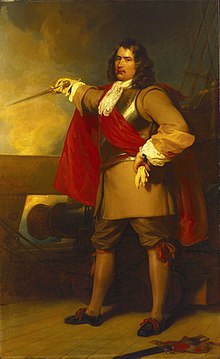Admiral Robert Blake
| Robert Blake | |
|---|---|

Robert Blake, General at Sea, 1598–1657 by Henry Perronet Briggs, painted 1829
|
|
| Nickname(s) | "Father of the Royal Navy" |
| Born | 27 September 1598 Bridgwater, England |
| Died | 7 August 1657 (aged 58) At sea off Plymouth, England |
| Buried at | Westminster Abbey (originally) St Margaret's, Westminster (now) |
| Allegiance |
|
| Service/branch |
|
| Years of service | 1649–1657 |
| Rank | General at Sea, Colonel |
| Battles/wars |
English Civil War First Anglo-Dutch War Barbary pirate campaign Anglo-Spanish War (1654) |
| Relations | Joseph Blake |
Robert Blake (27 September 1598 – 7 August 1657) was one of the most important military commanders of the Commonwealth of England and one of the most famous English admirals of the 17th century, whose successes have "never been excelled, not even by Nelson" according to one biographer. Blake is recognised as the chief founder of England's naval supremacy, a dominance subsequently inherited by the British Royal Navy into the early 20th century. Despite this, due to deliberate attempts to expunge the Parliamentarians from history following the Restoration, Blake's achievements tend not to receive the full recognition that they deserve.
Blake was one of thirteen siblings born to a merchant in Bridgwater, Somerset, where he attended Bridgwater Grammar School for Boys. After attending Wadham College, Oxford, he had hoped to follow an academic career, but failed to secure a fellowship to Merton College, probably because of his political and religious views (although it is said his height, 5 foot 6 inches, went against him).
After his departure from university in 1625, it is believed that Blake was engaged in trade, and a Dutch writer subsequently claimed that he had lived for 'five of six years' in Schiedam. Having returned to Bridgwater, probably because of the death of his mother in 1638, he decided to stand for election to Parliament.
In 1640 Blake was elected as the Member of Parliament for Bridgwater in the Short Parliament. When the English Civil War broke out during the period of the Long Parliament, and having failed to be re-elected, Blake began his military career on the side of the parliamentarians despite having no substantial experience of military or naval matters.
...
Wikipedia
